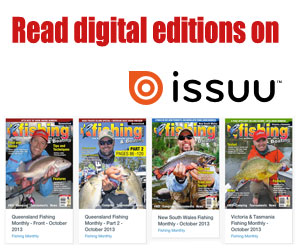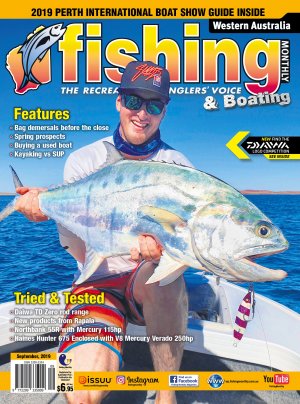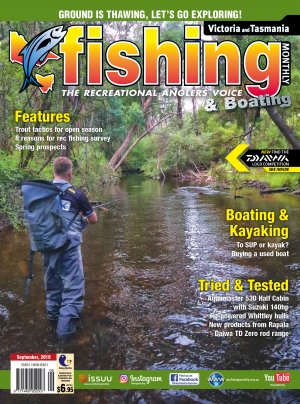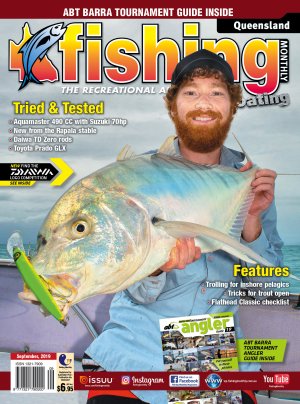Fishing can be expected to move into top gear as Summer approaches. As water warms, items that fish feed on become progressively more active and the fish respond.
Lots of terrestrial and aquatic insects, such as nymphs and mudeyes, should be showing by now and there should be plenty of mayflies, caddis, dragonflies and beetles on the move.
Worms and grubs will get washed in whenever there is enough rain. Yabbies and shrimps emerge fromThis activity, the warming water and longer daylight hours with increased light intensity means heightened fish activity and that's where we come in. Active fish take lures, baits and flies and we like that.
Redfin are among the most active. By now most will have finished spawning and will be looking for food.
Hunt for the larger ones in deep water with ice jigs, bobbed lures, spoons, soft plastics and ultra-deep diving lures or bobbed yabbies, scrub worms or shrimps.
In shallower water try flashy, noisy spinning-blade lures, spinnerbaits, small jigs, soft plastics, larger flies or scrub and tiger worms.
Try at different depths and once one fish is located, keep working the area to see if you can bring a school on the bite. Watch out for a lurking Murray cod that might take your hooked redfin – it can be a traumatic experience on light gear!
Best places to try include Googong Reservoir and Canberra's urban lakes Burley Griffin, Tuggeranong, Ginninderra, Gungahlin and Yerrabi. They all have big populations of redfin from tiddlers to specimens occasionally approaching 2kg.
Many are heading upstream in the rivers to spawn, searching for food as they go. They will eagerly take small yabbies, shrimps, scrub and tiger worms and a great variety of spoons, deep-diving lures, spinnerbaits, soft plastics and big flashy flies on sinking line.
They can be found singly, sometimes in pairs and occasionally in small schools. Try spots where water drains through constrictions into more open water, around rocks and fallen trees and especially alongside sandbars.
In lakes they can be found anywhere but prefer to sit alongside rocks, tree stumps, steep rocky banks or in deep water close to shore. Bobbed yabbies, shrimps and scrub worms can be deadly in these locations but lures can be equally effective.
Apart from Burrinjuck, other places worth a look include Googong, Canberra's urban lakes, Blowering and Wyangala and the feeder rivers including the Tumut, Lachlan, Abercrombie, Molonglo and Murrumbidgee.
Catfish also are on the move, mostly building their remarkable circular nests of rocks and pebbles and feeding as they work.
Best baits are scrub and tiger worms but they will take small yabbies and shrimps. They also attack lures dangled too close to their nest, but that's not considered very sporting.
The best place to find catties these days is either Wyangala or the myriad farm dams throughout the region where the fish have been stocked and where they do quite well.
Trout fishing is wonderful at this time of the year. The browns and rainbows in Eucumbene, Tantangara and Jindabyne all have finished spawning and they are hungry, so bait, lure and fly fishing are all worth a try.
Work the shallow banks at night and early mornings with PowerBait, scrub worms and bardi grubs on light line with long leaders for best results.
Fly fishers could try polaroiding during the day with small nymphs, cased caddis or larger wets or with Mrs Simpson, Craig’s Nighttime, Woolly Worm or Woolly Bugger at night.
Trollers should work Wonder spoons, small minnow patterns or yellow-winged Tasmanian Devils, on flat line or lead core.
Either way, you should be assured of a lot of fun and a feed if you want it.
In the first instance a young Queensland man, reportedly a fit lifesaver, attempted to swim from the shore of Lake Jindabyne to Cub Island, a few hundred metres away. A fisherman witness said the man swam about 200m, put his hand in the air then sank. His body was recovered a day later.
At the time there was heavy snow on the hills, it was bitterly cold, a massive gale was blowing and the water was just 6°.In the second incident another fit young man, from Queanbeyan, disappeared from his surf ski in Canberra's Lake Burley Griffin. It was very cold, a strong wind was blowing and the water was 8°. His body was found eight days later.
Both of these tragic events highlight several things.
He had to swim only a few metres but never made it. He ‘died’ but luckily was rescued within a few minutes and brought back to life through expert medical care.
The second message surely is one that all anglers, boaters, skiers, swimmers and other people must hammer into their psyches: It can happen to me.
These two victims probably thought it would always be that ‘other bloke’ but it was them.So recognise that it really does happen, and be ready for it. Always fish with someone who could help you if you get into trouble.
Wear a lifejacket and don't fool around in unsuitable boats. Don't take risks in poor weather or in water where there are dangerous rocks, trees or shallows.
Don't increase your susceptibility to cold or to an accident by drinking excess alcohol. Don't stand up in a boat or lean over the side unless you have to. Don't fool around. If you have a mate who fools around, ditch him.
Take your fun seriously and live to enjoy it another day.
itself nicely in the soft grass for either the esky or release.
flooded trees to bring this 62cm golden perch out of hiding.
Reads: 3429
David Knight, still rugged up for cold weather, with a typical fat Spring rainbow taken on PowerBait in Lake Eucumbene.
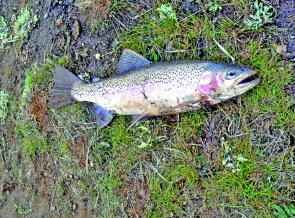
This large Eucumbene rainbow obligingly fell off the hook after capture, presenting
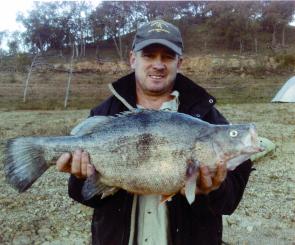
They breed them big in Burrinjuck. Wayne Boulding bobbed small yabbies among the

